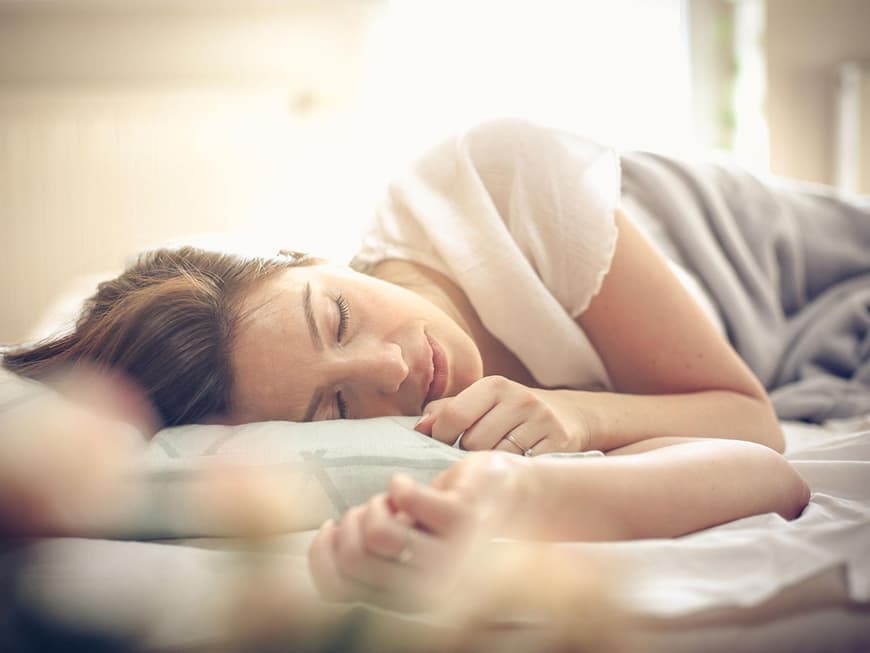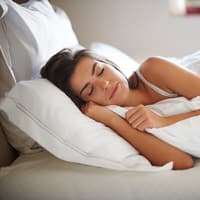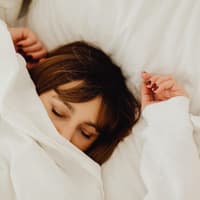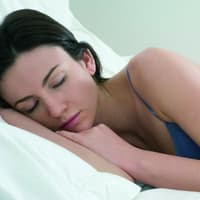
Causes of problems falling asleep
Many people are unable to fall asleep due to thoughts about future tasks and challenges constantly running through their heads. Furthermore, many of us only have the peace and quiet and time to think in bed at night. And then worries and sorrows come to mind that prevent you from falling asleep. However, if these mental sleep disorders become chronic and too stressful, you should always consult a doctor.
A lack of exercise also leads to problems falling asleep. We take our natural urge to move into bed with us and become restless. However, food and stimulants such as alcohol, nicotine, caffeine or hearty or very sugary food also often prevent you from resting.
Other causes can of course be illnesses such as cardiovascular or neurological diseases. If you suspect an illness is behind your problems falling asleep, please consult a doctor. The following tips are not aimed at illness-related problems falling asleep!
Tips for falling asleep quickly
- What many people think is a myth can actually help you fall asleep: counting sheep. When counting sheep, you have to concentrate on counting and therefore hardly on your thoughts or problems. Of course, it is not important whether you are counting sheep, raindrops or anything else, but rather that you relax and are exposed to few stimuli.
- Concentrating on your breathing works in a similar way to counting sheep. Try it for yourself: If you concentrate on your breathing, you won't be able to think about anything else. This distracts you from your problems and worries. Another positive effect is that your breathing becomes calmer and you can relax better.
- Even if it has not been scientifically proven, goodnight milk can still help. It fills you up and relaxes you. It also often has a psychological effect: many of us associate it with our own secure childhood and so it allows us to relax. It also contains the sleep-promoting substances melatonin and the amino acid tryptophan.
- Reading before going to sleep can also help. As a general rule, however, you should not read in bed, but rather on the sofa or in an armchair. This is because, ideally, your brain should only associate bed with sleep. Furthermore, you should not pick up any books that make you emotionally upset. Reading can then quickly become counterproductive.
- A cozy warmth also helps you to fall asleep. Take a warm shower or a relaxing bath before going to bed. However, the water should not be too hot.
- Sport can also help you fall asleep. Our bodies are often exhausted and long for rest. However, this condition often only occurs later after exercise. That's why you should have last exercised at least two to three hours before going to bed.
- What helps with children also works for adults in this case: fixed habits and rituals, which should not, however, upset you emotionally. Make sure you have the same routines before going to sleep. This will get your brain ready to fall asleep and rest at an early stage. Once again, the bed is for sleeping.
What you should avoid
Most Germans have probably tried the following activities to help them calm down and fall asleep. However, these tend to be counterproductive and should therefore be avoided.
Falling asleep while watching TV is a common occurrence. However, watching TV is rather unsuitable for falling asleep in a targeted manner, as the blue light from the TV inhibits the production of the sleep hormone melatonin, according to experts. Incidentally, smartphones and computers also emit this light. It is therefore better to keep them off before going to bed.
Although alcohol helps you fall asleep quickly, the sleep that follows is less restful and deep. In fact, regular and heavy alcohol consumption can lead to chronic sleep disorders.
Trying to force yourself to fall asleep is also counterproductive for falling asleep. If it doesn't work, you will quickly become agitated and frustrated. It is better to get up again and try one of the tips mentioned above. If you then notice that you are getting tired, go back to bed.





